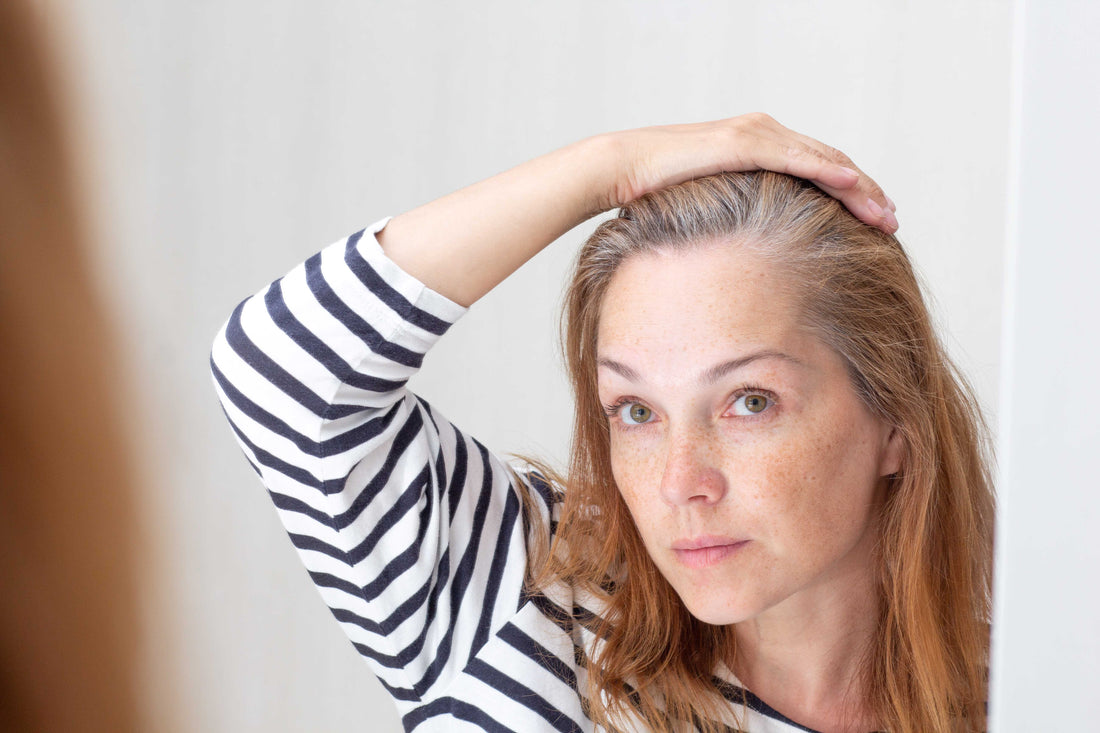
Grey area: Why does our hair go grey and what makes some people go grey earlier than others?
Ah your first grey hair. It doesn’t exactly bring the air of excitement that comes with so many other firsts but it’s a rite of passage, nonetheless. But why does our hair go grey and why does this milestone come much earlier for some than others?
Firstly, hair doesn’t suddenly ‘turn’ grey. Your hair colour is set when your hair follicle produces hair, so if for example, a strand begins as brown, the only way it will change is if you colour your hair.* What happens is that as we age, our hair follicles produce less melanin (pigments of colour). This means that when our tresses go through their cycle of regeneration, the older you are, the more likely it is that your new hair will ‘grow in’ as grey. According to research, grey hair first appears in both men and women between the ages of 34 and 44, with the chances of hair greying increasing 10% to 20% every decade after age 30.**
The influence of lifestyle factors
We often remark that stress has led to us ‘going grey’ but whilst emotional stress has been proven to impact wound healing and inflammation levels in our body, science has found that most grey hair is not directly related to stress. Genetics play a key role in the timing of the onset of grey hair with lifestyle factors (including stress) impacting the process in different ways. Although being under stress can’t change hair colour, it can trigger telogen effluvium, a common cause of temporary hair loss due to excessive shedding. Subsequently, if you are over 35 and your hair is shedding and regenerating faster, it's possible that the new hair coming in will now be grey.
Grey hair can also indicate an illness if it occurs at a young age. Health problems that may trigger grey hair include vitamin B12 deficiency, thyroid disease and alopecia areata: a common cause of hair loss that can occur at any age. It usually causes small, coin-sized patches of baldness on the scalp, although hair elsewhere such as the beard, eyebrows and eyelashes can be affected.****
If you want to predict when your hair is most likely to start growing grey, your best bet is to examine your family tree. When and how your hair grey’s is influenced mostly by genetics. This is especially true for those who notice their hair growing grey under 20, with the genes you inherit from your parents largely responsible for premature greying.**
The silver lining.
Many decide to embrace their silver stands and look amazing doing so! Salma Hayek, Andie MacDowell, Lily Allen and Sarah Jessica Parker have all been praised for giving grey a glam-over. There are also many ways you can make the most of your new hue:
- Use the right products: As grey hair has no natural pigment; it can turn yellow with time. To mitigate this, use a clarifying shampoo weekly. You can also help to keep your grey bright with the use of colour-correcting purple shampoos, which will also help prevent any brassiness or sun-induced yellowing.
- Make the most of your new hair texture: Your oil glands are producing less sebum now, which means that your locks will feel dry and coarser – but it isn’t all bad. Whilst you will need to stay on top of hydration, your new texture brings the benefits of drying more quickly, appearing thicker and holding a style or wave for longer - now that’s a bonus we are all on board with!

@andiemacdowall

@jennifer_yepez
P.S. Don’t do this…
The biggest grey hair sin is plucking hairs from your head. Whilst tempting, yanking out stray greys can actually cause trauma to the root of the hair, along with increasing the risk of ingrown hair, possible scarring and infection. If you don’t wish to embrace your grey locks, colouring your locks is a great option. Experts suggest the right time to start dyeing them is once your hair is about 30 percent grey. For the most professional result, make an appointment for a colour consultation with a hair colourist.
Sources
* Trüeb RM. Pharmacologic interventions in aging hair. Clin Interv Aging. 2006;1(2):121-9. doi: 10.2147/ciia.2006.1.2.121.
** health.harvard.edu
***Library of Congress
****British Skin Foundation
